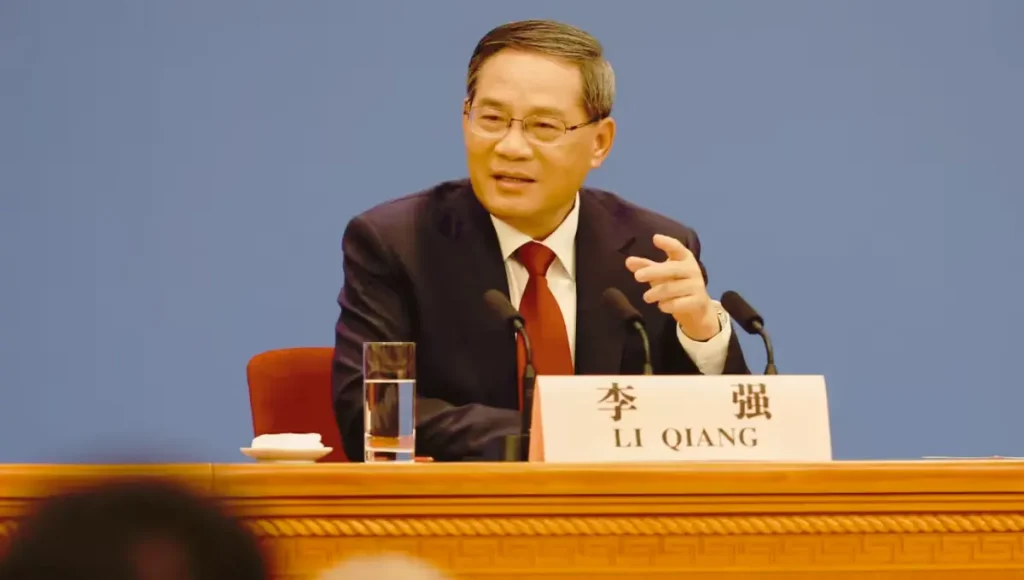On Monday, China announced a departure from a longstanding tradition, revealing that Premier Li Qiang would not be holding a news conference at the conclusion of the National People’s Congress (NPC). This break from decades of precedent closes one of the few avenues providing insights into government policymaking.
China Cancels Premier Li’s NPC News Conference – Nikkei Asia
Spokesperson Lou Qinjian made the announcement just before the commencement of China’s legislative “two sessions,” consisting of the Chinese People’s Political Consultative Conference (CPPCC) and the NPC. Lou emphasized that information would be easily accessible to the media and the public through government reports released throughout the weeklong proceedings and interviews with lawmakers.
Crucially, Lou mentioned that this practice of the premier not holding briefings after future NPCs would continue.
Ja Ian Chong, an assistant professor of political science at the National University of Singapore, suggested that this decision might be a strategic move to sidestep uncomfortable questions about China’s economic slowdown and demographic challenges. Chong expressed concerns, stating, “The further reduction in transparency may allow the [Communist Party] to better manage information, but it is likely to also fuel greater speculation and cause investors to worry more.”
Traditionally, China’s premier would meet with reporters on the final day of the NPC, addressing a range of topics from socioeconomic policies to international relations. Although these sessions were carefully orchestrated, they served as one of the few occasions for foreign journalists to pose questions and gain insights into the top leadership’s perspectives.
“Reduced transparency may aid control but fuels speculation, heightening investor concerns.”
At last year’s National People’s Congress (NPC), Premier Li took over from his late predecessor, Li Keqiang, conducting his inaugural media briefing. During this event, Li underscored the imperative for China to enhance self-reliance and allayed concerns surrounding the nation’s growth trajectory. He also dismissed worries about Hong Kong’s diminishing competitiveness as a global financial center, a concern that arose after the implementation of a national security law in mid-2020.
China’s restricted public forums, tightly controlled by the government, make such media interactions pivotal. The Asia Society highlighted that the tradition of an end-of-session news conference originated in 1991 with Li Peng and was formalized by Zhu Rongji in 1998. In anticipation of the upcoming two sessions, the society speculated that Premier Li might spend approximately “two hours reading prepared replies to carefully screened questions from journalists.” This suggested that the responses could provide insights into government policies and potentially illuminate economic debates within the leadership.
A Beijing-based political science scholar, who chose to remain anonymous, expressed limited surprise at the change, citing the ongoing revision of the law governing the State Council – the premier-led top administrative organ – by the NPC. This significant amendment, the first in over 40 years, could potentially adjust the council’s powers.
According to the scholar, the alteration signals a decline in the influence of both the State Council and the NPC, portraying Premier Li’s weakened position. The scholar remarked, “Furthermore, the State Council has become more conservative since Li took office. Over the past year, his performance, particularly in the economic area, has been disappointing, making it difficult for him to handle even prearranged questions.
Read also: Nikki Haley Secures First Primary Win in Washington DC, Defeating Donald Trump
The expert further noted that President Xi has not yet convened the third plenum, a crucial meeting in China’s political cycle where economic reforms are typically endorsed. Additionally, there seems to be a lack of consensus on the overall budget arrangements for this year, making it challenging for Premier Li to hold a press conference, he observed.
A senior research fellow at a pro-government think tank in Beijing, who also opted for anonymity, echoed a lack of surprise regarding Monday’s announcement. He remarked, “We’re currently undergoing a significant reassessment of how China operates and engages with the world.”
On the other hand, Victor Shih, a specialist in Chinese economic policy at the University of California, San Diego, expressed more astonishment. He commented, “This will undoubtedly diminish the profile of China’s premier, possibly by design. For Chinese citizens and the international community, it represents a missed opportunity to grasp the overall framework of China’s economic policy.
